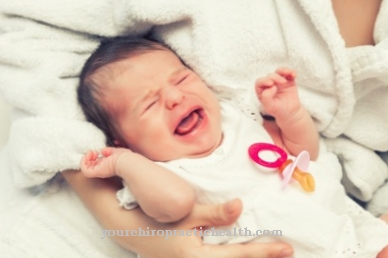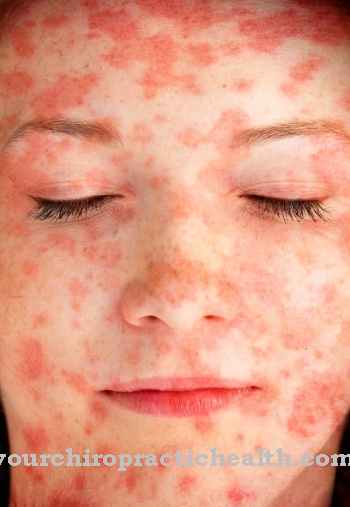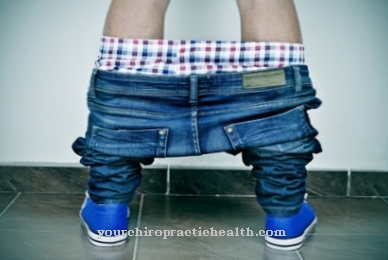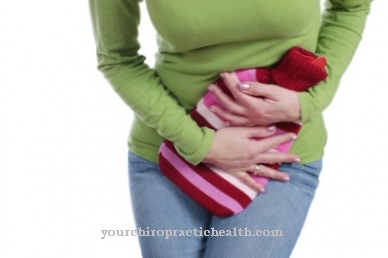Every woman has probably complained that her breasts are swollen. In many cases, those affected complain of tense, slightly or significantly enlarged breasts that are sometimes very sensitive to touch. Behind the swollen breasts however, there does not always have to be an illness; nor is it said that every swollen breast has a harmless background.
What are the characteristics of swollen breasts in women?

The woman notices that her breasts have become noticeably larger. The skin can feel uncomfortably tight; the chest is much harder in many cases. Those affected also complain of being sensitive to touch. Even very gentle touches lead to pain. The pain can also be relatively severe.
In many cases, women also find that their breasts are significantly warmer than the rest of the body. Sometimes swollen breasts can be caused by the cycle. In this case, the doctor speaks of so-called mastodynia, whereby the term mastalgia can also be used. Other causes can very well cause corresponding symptoms. Many patients also complain of movement-dependent pain. The breasts hurt during sporting activities.
causes
The female cycle causes puffy breasts. Because of this, it's no wonder many women are familiar with the feeling of swollen breasts. In this context, the doctor speaks of PMS - the premenstrual syndrome. This syndrome occurs before a menstrual period and is also the reason why women - during this time - suffer from mood swings. Above all, breasts swell - in this phase - because the hormone concentration in the body fluctuates.
Estrogen levels rise after your period; water retention takes place in the tissue of the breast. It is the water retention that causes the breasts to swell and cause gentle pain shortly before the onset of menstruation. Swollen breasts can also occur when women have an impaired hormonal balance. If too much estrogen (or too little progesterone) is produced, the woman's breast swells. The fact is that swollen breasts are always the result of hormones. There are either extreme fluctuations or disorders of the hormone balance.
You can find your medication here
➔ Medicines for menstrual crampsDiseases with this symptom
- Breast inflammation while breastfeeding
- Benign breast tumors
- Lipoma
- Hormonal imbalances
- Heart failure
- mastitis
- Mastopathy
- Pathological secretion of the mammary gland
- Cirrhosis of the liver
- Inflammation of the kidneys
- PMS
- Breast cysts
- Breast cancer
- Progressive systemic scleroderma
- Kidney weakness
Diagnosis & course
Possible causes of swollen breasts are PMS - premenstrual syndrome or hormonal disorders or hormone fluctuations. It is important that the doctor is informed not only of the symptoms, but also the duration and frequency. As part of the symptoms, the doctor must palpate the breast and examine the breast tissue for any changes.
As a rule, the doctor feels a hardening of the tissue; this hardening is perceived by women as tension. In many cases, the doctor will also perform an ultrasound scan so that the breast tissue can be examined more closely.If a tissue change is suspected, a mammography is ordered as part of further examinations.
However, several examinations do not mean that the doctor has any suspicion that other possible causes may be the main reason for the swollen breasts. Often it is purely a precautionary measure that should not give rise to uncertainty.
Complications
Swollen breasts in women are not uncommon, depending on their stage and circumstances. If they are due to pregnancy, they are completely normal and healthy. A nursing woman, on the other hand, should pay attention if she notices swollen breasts. Milk congestion may form because the baby cannot be attached or the breast does not drink. Milk congestion occurs when milk builds up in the breasts. In these cases, it must be emptied in good time - either the baby still drinks it empty or the milk is pumped out and stored or disposed of.
If this does not happen, there is a risk of breast inflammation, which is even more painful for the woman and is treated with antibiotics. For the baby, this means that the switch to the bottle must follow, as it is not allowed to have breast milk during this time. Swollen breasts outside of pregnancy or breastfeeding should always be a warning sign.
If the woman is definitely not pregnant, there may be other hormonal causes - harmless examples are women who notice swollen breasts as a symptom before or during their menstrual period. In the worst case, the hormonal balance is mixed up, which can have many causes. Menopause, hormonal disorders, or diseases of the organs that are responsible for producing hormones in the body could be the cause of swollen breasts.
When should you go to the doctor?
Many women know it: their breasts are tense and swollen. It feels uncomfortable. Most swollen breasts in women are accepted as they are often related to the female cycle. After a few days, the swelling and the associated tension and occasional tenderness will go away again.
To be on the safe side, however, the gynecologist should be asked whether the swollen breasts are actually caused by the cycle, as the woman suspected. If the condition is very difficult for the woman to endure, for example during her job, the gynecologist can prescribe soothing preparations.
However, behind swollen breasts in women can also be serious medical conditions. It should be clarified whether the swelling is possibly due to a tumor, especially if the swollen breasts are permanent. Very often, however, an unbalanced hormone balance causes swollen breasts in women. Doctors use two different terms to differentiate: mastodynia means the cyclically caused swelling, tension and pain of the breasts, mastalgia describes the phenomenon when this fact does not exist.
Doctors & therapists in your area
Treatment & Therapy
The doctor orients his treatment according to the cause, the symptoms as well as the severity of any complaints and pain. For the most part, the causes of a swollen breast are harmless, so no special treatment is required. Especially when the pain is relatively "gentle" and pathological causes are not the trigger, many medical professionals forego therapy.
However, it is advisable that women, if they frequently suffer from swollen breasts, consult a doctor so that the condition can be clarified. However, if the women complain of enormous complaints, hormone therapies can provide relief and alleviation of the symptoms. The doctor determines if the body is deficient in hormones and can react to this so that it can help the body get the missing hormones. On the other hand, there is also the possibility that there is an excess of hormones and hormones have to be reduced.
Drug therapies are used here. Even if those treatments bring good results, they are often characterized by side effects. Due to the side effects, many medical professionals are of the opinion that only purely herbal products should be used, which should bring the hormone balance back into balance. These have the same effect in the end, although it can take longer for the remedy to develop its full potential in the body and it can sometimes take longer for the symptoms to subside or get significantly better.
A popular remedy is monk's pepper. However, it can sometimes take three months for women to notice the positive effects. However, herbal remedies can also have positive effects on the hormonal balance within a few days, so that the symptoms can be alleviated very quickly. However, it also depends on how severe the woman's discomfort is.
Outlook & forecast
In most cases, the swollen breasts are a harmless symptom that does not necessarily have to be treated by a doctor. In many cases, the swollen breasts appear during your period and are not only swollen but also tender. If the symptom does not go away on its own, the cause can be determined relatively easily with a mammogram or an ultrasound examination.
If the pain or swelling persists, hormone therapy can be performed. However, this only helps if the body lacks certain hormones or if they are produced in excess. As a rule, this therapy quickly leads to success.
If the swollen breasts appear during pregnancy, it is a common symptom. They usually go away after the breastfeeding period ends. In the event of a blocked milk, breast milk can also be expressed.
Menopause can also lead to swollen and sore breasts, and it is also a common and harmless symptom. Various options for self-help are available to the patient. In most cases, however, the symptom is not long-lasting and will go away on its own.
You can find your medication here
➔ Medicines for menstrual crampsprevention
Swollen breasts can hardly be prevented. This is because the hormone production is responsible for it. It is advisable to contact a doctor at the first signs. In this way, hormonal disorders can sometimes be detected early and subsequently treated. In this way, the woman can react before the symptoms get worse and positively influence her body or hormone balance.
You can do that yourself
Women with swollen breasts can put cooling compresses on the breasts. A well-fitting bra that supports the breasts is also recommended. Herbal teas, for example with sage or hibiscus, often help against swollen breasts. They have a draining effect and reduce the feeling of tightness in the chest that is associated with swelling. For some women with swollen breasts, a visit to the sauna is also very good.
If the swelling is particularly severe, black tea, coffee, chocolate and cola should be avoided. The ingredients tea, caffeine and cocoa can exacerbate the symptoms. It also makes sense to eat low-salt foods. Table salt also binds fluid in the tissue and can therefore increase pain and swelling.
If an increased prolactin level is the cause of swollen breasts in women, monk's pepper supplements can help. They inhibit the effects of the hormone prolactin in the brain. The preparations include monk's pepper, a mixture of monk's pepper, cyclamen, blue buttercup, Ignatius bean and tiger lily. Homeopathic remedies can also help with swollen breasts in women. These include common easter egg, spotted hemlock, saw palmetto and dwarf palm.
Women with swollen breasts should palpate their breasts shortly after menstruation every month to identify possible changes early and to prevent the swelling from worsening.




.jpg)
.jpg)







.jpg)

.jpg)
.jpg)











.jpg)